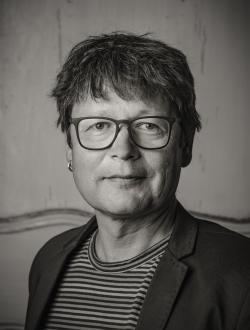
© Alan Humerose
Member of the Board of Directors
+41 26 300 71 40
raphael.berthele@unifr.ch
Full Professor of Multilingualism, University of Fribourg
Research interests
- Multilingualism: intercomprehension, receptive competences, cross-linguistic interaction
- Cognitive linguistics
- Variational linguistics
- Folk linguistics
Research projects (direction)
More
Less
Duration
01.2025 - 12.2028
The project “How much longer until B2?” investigates the time needed to attain a targeted level in a foreign language, with a specific focus on organisations associated with the Swiss federal government. These organisations generally require...
More
Duration
02.2024 - 01.2028
Vocabulary learning in a second or foreign language can take place in many different ways. In our project, we want to better understand how learners learn words incidentally or intentionally through the use of digital tools. Our project covers...
More
Duration
01.2024 - 12.2027
Language is what distinguishes human beings from all other species. However, its evolutionary origins remain poorly understood. In addition, today's communicative environment is being reshaped by digitisation and artificial intelligence:...
More
Duration
02.2024 - 12.2026
This interdisciplinary research project focuses on the relationship between multilingualism and plurilingualism, political institutions and legal conditions in Switzerland.The Swiss Confederation is a federal state with four national languages....
More
Duration
04.2021 - 12.2024
Digital translation tools and dictionaries have become an indispensable part of language use. DeepL, Leo and Co. are used extensively and for various purposes, however, their benefits for foreign language teaching and learning remain contested....
More
Duration
01.2021 - 12.2024
Vocabulary is the basis for receptive and productive language use. Influential theories on second language acquisition and learning consider vocabulary and grammar to be complementary, rather than opposing elements of language. Vocabulary...
More
Duration
11.2020 - 05.2024
This exploratory project addresses the question of the origins of individual differences in language aptitude, at different levels of language processing including but not limited to native language phonological, lexical and syntactic processing....
More
Duration
01.2017 - 12.2021
Swiss National Science Foundation, project funding, project no. 176338
The aim of the project is to examine the different ways in which French, German and Italian speakers achieve cohesion in narrative spoken discourse. Our approach is derived...
More
Duration
01.2017 - 03.2021
The potential to learn foreign languages varies from one individual to the next and has been investigated by many researchers as of the early 1950s. Individuals’ ability to learn foreign languages relies on various elements that have been...
More
Duration
01.2014 - 12.2017
In the past 30 years, research on the linguistic expression of spatial relations has shed light on systematic structural and lexical differences between languages. One such difference concerns how some Romance and Germanic languages (e.g....
More
Duration
01.2017 - 12.2017
The standing of German in the Canton and City of Fribourg has been a topic of public debate for decades. Currently, French and German are official languages of the canton, and their use is anchored in the constitution; moreover, it is possible...
More
Duration
01.2012 - 12.2014
The project "Language of origin and language at school: are language skills transferable?" was initiated to explore potential transfers between the language of origin and the language spoken at school in schoolchildren who attend heritage...
More
Duration
01.2013 - 12.2014
Project conducted by the University of Teacher Education Graubünden PHGR
The project "Rumantsch receptiv" was created to develop teaching material for independent study and/or use in language courses. The goal of the project was to design...
More
Title
Evolution of Semantic Systems EoSS
A joint research initiative of the Evolutionary Processes in Language and Culture Group and the project Categories across Language and Cognition, Max Planck Institute for Psycholinguistics, Nijmegen
Duration
01.2011 - 12.2013
A joint research initiative of the Evolutionary Processes in Language and Culture Group and the project Categories across Language and Cognition, Max Planck Institute for Psycholinguistics, Nijmegen
The main aim of the EoSS project is to...
More
Duration
01.2012 - 12.2013
Concluded at the end of 2013, the project "Italiano ricettivo" developed the teaching material Capito?, which is intended for use either in classroom settings or as self-study tools. The aim of Capito? is the development of receptive...
More
Duration
01.2010 - 12.2013
Sinergia-Project of the Swiss National Science Foundation, no. 130457
This project examines dimensions of multilingualism that have heretofore received little attention in research. The question at the core of the project concerns how the...
More
Duration
01.2010 - 12.2012
Adult language acquisition (of German) has generated a great deal of scientific interest over the past decades. However, variation in input and output as a consequence of specific sociolinguistic contexts has mostly been neglected so far....
More
Duration
09.2008 - 04.2011
This mandate from the cantonal government in Graubünden concerned the follow-up of introducing the newly consolidated written language Rumantsch Grischun to the so-called pioneer communes in the Canton of Graubünden. The communes in question...
More
Duration
01.2009 - 12.2009
Chunsch druus? (Swiss German for “get it?”) is a learning programme aimed at the general, mainly younger learner who wishes to develop key linguistic competences necessary for coping with the challenges of everyday life in the German part...
More
Research projects (collaboration)
More
Less
Duration
06.2022 - 12.2022
For more than three decades, the Canton of Valais “Bureau des Echanges Linguistiques” (office for language exchanges) has been responsible for coordinating language exchange programmes in the canton’s two language regions as well as outside...
More
Duration
11.2010 - 03.2013
This pan-European project was initiated in 2010 by the British Council and aimed at developing an index in order to compare the language environment in 20 European countries. The index captures the following aspects: (foreign) language teaching,...
More

